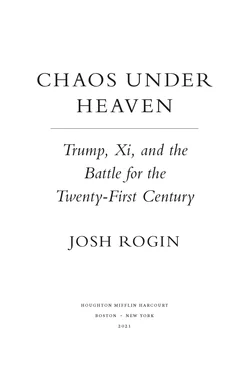Bannon, on the other hand, did know who Guo was. Not only was Guo an outspoken critic of the CCP, he was also in the process of being vetted by the FBI and CIA to determine whether he could be a source of crucial intelligence information on the Chinese government, the CCP, and its leadership.
“Hang on a sec,” Bannon pleaded, as Reince Priebus happened to come into the Oval Office. Bannon went over to the desk of Communications Director Hope Hicks and picked up her phone to call Pottinger, whose office was in the Old Executive Office Building next to the White House.
“Get the fuck over here right now,” Bannon told Pottinger.
Pottinger ran over to the West Wing. Bannon showed him the package of information that had come from Wynn. Pottinger said that Guo might have already sought asylum and simply extraditing him might not be a straightforward matter. And he pointed out that the United States did not have an extradition treaty with China. They urged Trump to let them handle it.
Eventually, Trump relented—but even as he did, he insisted that Guo eventually be delivered into the hands of the Xi government.
“We’ve got to get him outta here because he’s raping everybody,” Trump insisted.
Bannon called in a team of FBI and other intelligence officials to brief him on Guo. The intelligence community was still working to vet Guo and his information, but he was clearly someone with whom they wanted to continue to engage. Moreover, they feared the precedent of handing over a high-value antigovernment defector to Beijing absent any judicial process.
Bannon stuck Wynn’s dossier on Guo in the safe in his office and never spoke of it again. He calculated that Trump would forget Beijing’s request and move on.
Bannon calculated correctly. Eventually, Attorney General Jeff Sessions agreed to put Guo into the system that governs political asylum applications. “We’ve got to make sure this guy is protected by the courts, so even Trump can’t send him home,” Bannon told Sessions.
The incident laid bare to everyone in the White House that Xi Jinping was playing a different game from the one they had seen played by past Chinese leaders with past US administrations. The Chinese president was appealing to Trump directly and playing on Trump’s belief in their close, personal relationship. By using American businesspeople including Wynn, moreover, Xi was attempting to cut out all the national security and political advisers around Trump who knew better than to give in to extravagant demands such as this one. It was just one of the perils of a presidency where private interests had as much sway as public servants, if not more.
The Steve Wynn Channel
Wynn denied that he ever gave Trump a “letter” about Guo Wengui but never denied talking to Trump about Guo on Xi’s behalf. Indeed, Wynn’s financial interests in pleasing Xi were huge and obvious. In 2017, Wynn Resorts owned four casinos: two in Las Vegas and two in Macau. However, his Macau casinos had been driving the company’s revenue. In the last quarter of 2017, as Business Insider reported, “Wynn’s corporate earnings jumped 30% entirely on the backs of the company’s two Macau casinos, Wynn Palace and Wynn Macau, which saw revenue growth of 65.5% and 24.1%.”
But his investments in the peninsula had long been rocky because Macau has been a key laundering point and destination for corrupt money in China. After assuming power in 2012, Xi ramped up anticorruption efforts in a bid to reassert the central government’s control, limit capital flight, and lock up his political rivals. More than a million party members were caught up in the crackdown. High rollers got scared and Wynn’s business tumbled. His Macau revenue dropped by as much as 35 percent a quarter. “Almost half the business of VIP is gone and may be shrinking,” he told shareholders in 2015. “In my 45 years of experience, I’ve never seen anything like this before.”
A year later, Steve Wynn was making nice with the Chinese government. In February 2016, instead of complaining about how CCP policy was making “planning and adjusting almost a mystical process,” as he did in 2015, he praised its economic management as “unequaled in the history of civilization” in a call with shareholders. He also told them to “remember that the Communist Party is a meritocracy in China” and reminded them that “although one leader may be a bit more conservative than his predecessor or a bit more liberal, generally speaking they want a successful life for the citizens of China and for the people in Hong Kong and Macau.”
Wynn Resorts’ share price jumped. It would not be the only example of how his fortunes were tied to the whims of the CCP.
After Trump’s victory in the November 2016 election, Wynn was named a finance vice-chair of the twenty-person Presidential Inaugural Committee. In January 2017, he was picked as finance chairman of the Republican National Committee. He stepped down the following year after a Wall Street Journal investigation revealed dozens of sexual misconduct allegations. Several former employees of his alleged that they were pressured to engage in sexual acts with Wynn. Wynn Resorts’ share price dropped by 6.5 percent after the report. The Republican Party, however, continued to accept donations from Wynn. In 2019, it received at least $400,000 from him.
Over a year later, after Bannon left the White House, Guo returned the favor. The two formed a partnership to fight a common enemy: the current leadership in Beijing. Guo, who many administration officials believe is aligned with a rival CCP faction working against the faction led by Xi, started the $100 million Rule of Law Foundation to investigate Xi and his cohorts. Guo chose Bannon to run it. Later, Guo hired Bannon to help run his company GTV Media Group. His initial contract was $1 million.
The story of Guo Wengui is wrapped in mystery, and over the next three years, he would go on to become involved in several public and private scandals. He hired a private intelligence firm called Strategic Vision to spy on several Chinese nationals inside the United States for $9 million, according to the firm. Guo said they were connected to high-ranking CCP officials. He later sued Strategic Vision and the company responded by accusing Guo of being a CCP spy himself, a double agent hunting dissidents for Beijing. During the litigation over the Strategic Vision contract, journalist Bill Gertz admitted he had taken a $100,000 “loan” from an associate of Guo. The Washington Free Beacon fired Gertz, who had written extensively on Guo for that website and in his own book. Guo went on to sue the Wall Street Journal, CNN, another Chinese billionaire named Bruno Wu, Trump confidant Roger Stone, and former Trump campaign adviser Sam Nunberg. As of this writing, these lawsuits were in various stages of litigation and Guo was trying to sell his luxury apartment at the Sherry-Netherland hotel. His status as a member of Mar-a-Lago was unclear.
“Foreign Agents”
The line between advising and lobbying is vague and open to interpretation. US law states that if an American citizen is trying to influence government policy or public opinion on behalf of a foreign government or foreign government official, that citizen is working as a foreign agent and must disclose those activities by registering with the Justice Department under the Foreign Agents Registration Act (FARA). In recent decades, it has been sparsely enforced and violations were almost never prosecuted as felonies—until the Trump administration.
But while unregistered foreign agents were held to account more under Trump, it was a capricious form of justice. Trump’s former campaign chairman, Paul Manafort, was tried and convicted of FARA violations, which contributed to his lengthy jail sentence, for his work on behalf of the pro-Russian former government of Ukraine. Obama’s former White House counsel Greg Craig was working with Manafort on this very project, but he was acquitted at trial on similar charges. Michael Flynn was doing unregistered work for the government of Turkey during the campaign, laundering the money through a Turkish businessman, but was never charged. Most violators are allowed to register retroactively with little consequence.
Читать дальше











